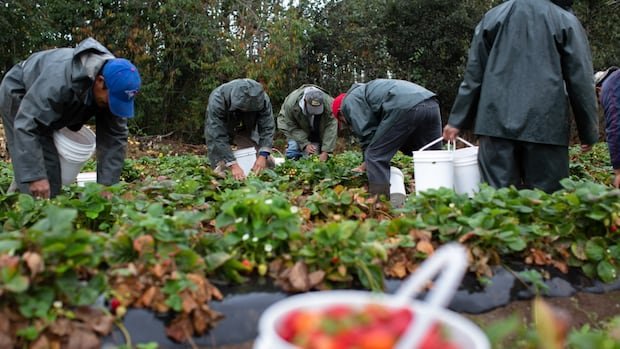An Ontario migrant farm worker has expressed concern about a proposal by the federal government that could potentially allow employers to deduct up to 30% of workers’ income for housing expenses.
The Migrant Workers Alliance for Change revealed a discussion paper from Employment and Social Development Canada outlining potential regulations for a new temporary worker program for agricultural and fish processing workers. This program would introduce sector-specific work permits, enabling temporary workers to work for any qualified employer in a particular industry rather than being tied to a specific job.
Although the new program is not expected to launch until 2027 at the earliest, the discussion paper suggests various housing deductions that employers could impose. At the upper end of the spectrum, the government is contemplating a deduction of 30% of pre-tax income, roughly equivalent to $1,000 per month.
A Jamaican migrant worker, who requested anonymity due to fear of reprisal, expressed dismay over the proposed deduction, stating that it would significantly impact his already modest $600 weekly income after taxes. He emphasized the financial strain this deduction would impose, affecting his ability to support his family back home and cover basic living expenses in Canada.
Employment and Social Development Canada stated that extensive consultations have been conducted regarding the agricultural and fish processing stream, involving discussions with international partners, industry stakeholders, and migrant worker advocacy organizations like the Migrant Workers Alliance for Change.
The consultation process, which included topics such as healthcare, transportation, wages, and deductions, has concluded, with federal authorities currently reviewing the feedback received.
The discussion paper highlights that the lowest housing deduction being considered is 5%, estimated to cost workers around $180 monthly. The amount deducted for housing depends on the type of temporary work program in which the migrant worker is enrolled.
Under the Seasonal Agricultural Worker Program, housing deductions are prohibited, while workers under low wage stream permits, such as those in fish processing, could potentially face deductions of up to 30% of their earnings for employer-provided housing.
Syed Hussan, the executive director of the Migrant Workers Alliance for Change, criticized the proposed 30% housing deduction, labeling it as a significant wage reduction that does not enhance the workers’ quality of life. He pointed out the discrepancy between the proposed deductions and the UN’s criticism of Canada’s temporary immigration system for fostering exploitation and slavery.
The Jamaican worker highlighted the lack of viable alternative job opportunities and the pressure to continue working despite unfavorable conditions due to the availability of other workers willing to take their place.
Hussan also raised concerns about the insufficient and unenforceable housing standards outlined in the discussion paper, indicating a shift from previous proposals that emphasized maintaining specific indoor temperatures. The migrant worker shared experiences of inadequate housing conditions, including the absence of air conditioning, which is deemed permissible under current regulations.
Advocating for migrant workers to attain permanent residency status for improved rights protection, the Migrant Workers Alliance for Change aims to address the challenges faced by temporary workers in Canada.
The government’s proposal for a sector-specific permit in the agricultural and fish processing stream is intended to offer more flexibility for workers; however, Hussan argued that true labor mobility remains limited due to the restricted pool of qualifying employers and challenges in accessing information about job opportunities across different regions.
In summary, the concerns raised by migrant workers and advocacy groups highlight the need for comprehensive reforms to safeguard the rights and well-being of temporary workers in Canada.

